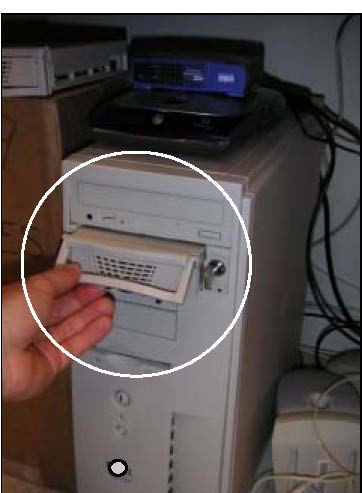Office
Server Computer
The second Linux server your small business would include would run all of the core services you need in an office including a print manager, email server, intranet webhost, staging server for your internet website etc. In other words, this PC running Linux would provide your office with a very affordable server for running applications and developing further infrastructure.
"The Linux server is a versatile tool to address needs as your business grows"
One obvious use is an intranet server where all of your office files, data, can be stored and safely backed up. Depending on your business needs this server could host a large Oracle database or a number of simple MySQL databases that help address infrastructure needs. It could also run your email services to the other office PCs, help manage print and telephony needs and so on. It is the versatile Linux tool sitting safely inside of your office firewall and addressing needs as they come up.
Another phenomenal point of Linux servers, especially if they are configured well is that they will perform better on slower PCs than other operating systems ever could have. Take your latest version of RedHat Linux and install it on a slightly slower model and watch it easily out perform Windows® XP on even the newer and much faster systems. Thus, your total number of PCs as servers and the capability of individual desktop PCs for daily business will be cheaper.
Finally, to put all of these wonderful PCs running Linux together, you need a reasonable network infrastructure which in today’s terms can be as simple as a SOHO network kit from any name brand manufacturer for as little as $100. That’ll include the cables, the cards, the drivers, hub, and instructions.
The other office PCs can remain non-Linux systems that simply connect via wireless or physical network to the Office Server running Linux. As the business expands, the Linux server can easily accommodate more users and upgrade or expand to meet the needs without additional licensing costs.
One recommendation I’ve made to small business owners is to invest in inexpensive but smart computer tools. Obviously, Linux is one. A little money on battery backup is another. But, one most often unknown smart tool is to invest in removable frame mounts for your hard disk drives for the Linux servers.
This allows you to buy off the shelf PCs and still gain the ability to hot swap new hard disks with Linux configured and running. In case of failure to either your firewall or office server you can literally pull out the bad drive and plug in a new already configured drive within seconds. The only thing it requires is a little extra up front time installing Linux on two hard disks, then ensuring that the backup of business data is done automatically to an independent disk drive, to a CD-R, or to another type of physical storage.

In Linux, the process to make this work automatically can be as simple as one very basic shell script.
Following these basic tips, your office can operate safely behind a Linux firewall that can be easily configured and inexpensively maintained and is far less likely to be troubled with the internet worms and hacking problems of other operating systems.
You also gain a Linux office server that is highly versatile. Versatile enough to operate as your email, print, and application manager or to simply provide your business with a stable database host. The capabilities are more numerous than you might imagine.
It all starts reasonably with the installation of Linux on two fundamental pieces of equipment to be a small business Firewall/Router and Server. Total cost, less than $1200. Total setup time, one to two days.
 TIP:
More details regarding the basic principles for setting up Linux
firewall for your small business are included here.
TIP:
More details regarding the basic principles for setting up Linux
firewall for your small business are included here.
If you found the information in this
article helpful, you may benefit from our other Linux articles.